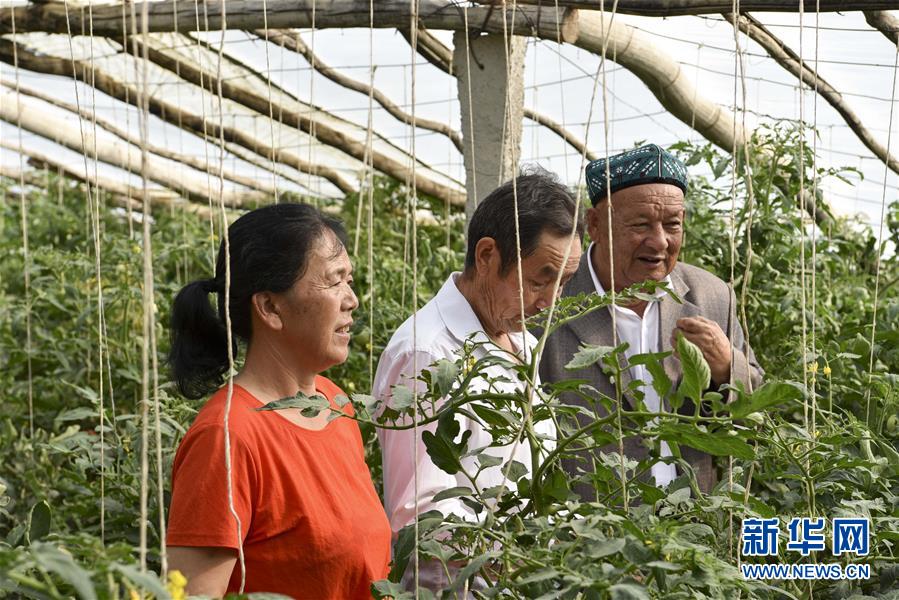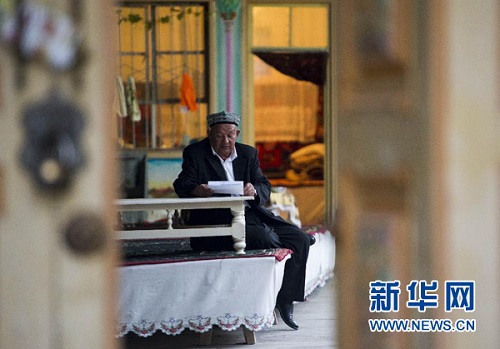People in a village in northwest China have strengthened ethnic unity and economic development, encouraged by words from Chinese President Xi Jinping in a letter.

Sawuer Menlik and villagers talk in a vegetable greenhouse on July 13, 2018. (Photos: Xinhua)
In September 2014, Xi wrote that Xinjiang's future will be determined in the grassroots, and that Party branches must unite villagers and strengthen their trust in the Party.
In a letter of reply to the villagers in Daxi Village, Weili County, Xinjiang Uygur Autonomous Region, Xi wrote, "Bring good Party policies into every household, boost production, ensure ethnic unity and let local people live better and better each day.”
Xi visited Daxi Village in June 2009 and again mentioned the village during his Xinjiang visit in April 2014. After that, Sawuer Menlik, secretary of the Communist Party of China branch of Daxi Village, wrote to Xi with excitement about the village's development in recent years and the people’s confidence in their livelihoods.
"The masses of all ethnic groups are like desert poplar trees. The roots are connected, so are the hearts," said Sawuer Menlik.
"In the summer 10 years ago, President Xi talked with us cordially sitting cross-legged under the grape trellis,” Sawuer Menlik recalled. “Villagers came to the grape trellis and read the letter over and over again on the day of receiving the letter from Xi.”
Hands in hands, hearts to hearts
For a long time in the village, the Uygur people raised livestock and planted fruit trees for a living, while the Han people mainly planted vegetables and cotton.
“If there is a naan (a staple local food), let’s eat together,” Sawuer Menlik said, calling on the villagers to break traditional customs and learn from each other.

Sawuer Menlik read the letter from President Xi at home on Sept. 17, 2014.
With the help of the Han people, the Uygur people started to plant cotton, and its planting area in the village soon reached 1,266 hectares.
The villagers also invested in the construction of a flour mill, a farm produce market, and greenhouses for vegetables. With the boom in agriculture, the per capita income of villagers exceeded 32,000 yuan ($4,556) in 2018.
The length of asphalt roads expanded from 8 kilometers to 78 kilometers. A total of 360 households now live in new houses. More than 400 households began to use natural gas, and more than 300 people had cars.
“Without the common endeavors of the people of all ethnic groups, we would not have today’s Daxi Village,” Sawuer Menlik said.
Besides cooperation for development, the village became one of the first in Xinjiang to pair people as “family relatives” among different ethnic groups for the sake of ethnic unity. This practice started in 2010. More than 150 households of the Han people and more than 400 households of the Uygur people been matched into 318 pairs of “relatives.”
Follow the Party’s leadership and enjoy better lives
“President Xi said, ‘Let local people live better and better each day.’ We developed production making best use of the courtyards and rural tourism, to broaden the path of prosperity and promote rural revitalization,” Sawuer Menlik said.
Grassroots officials helped a villager develop his courtyard into tourist attraction, earning nearly 1,500 yuan each day.
The village is now a 3A level scenic spot, with a museum, a folk customs street, a night market, 36 gardens, 9 homestays, and a pear garden of 133 hectares.
(Compiled by Zhan Huilan)


